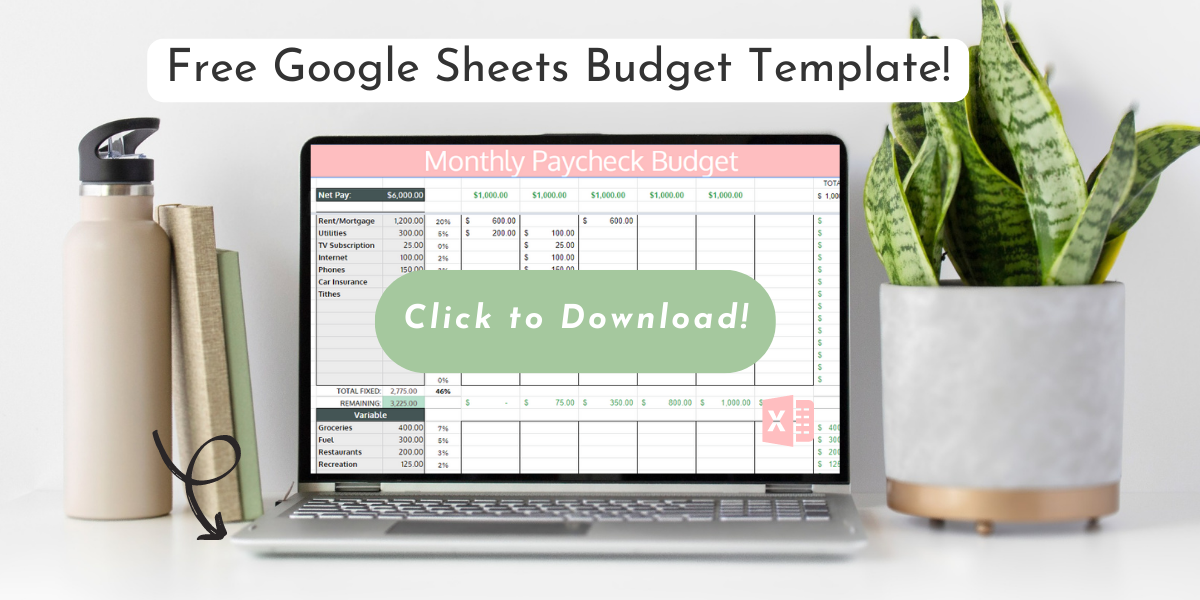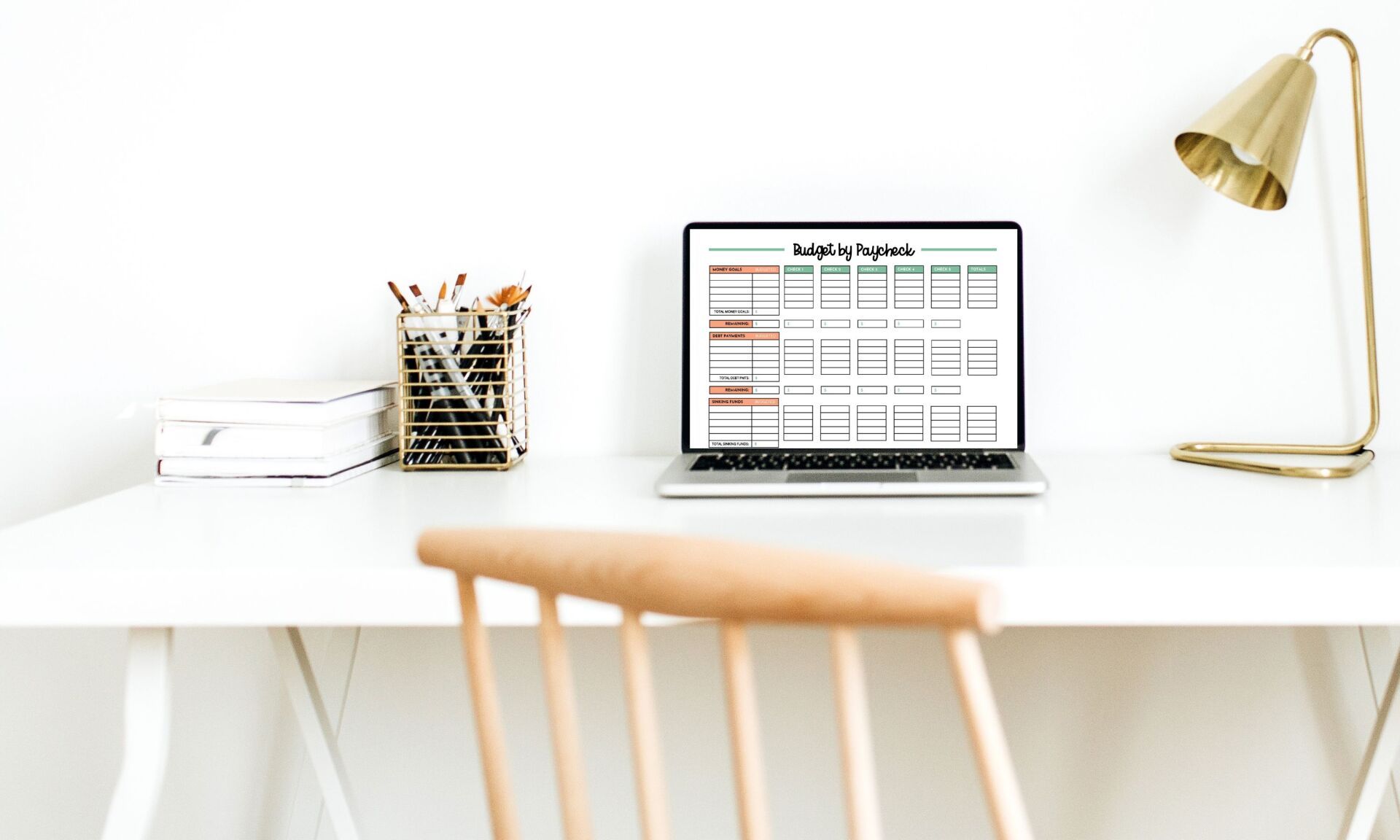7 Short-Term Finance Goals
Short-term financial goals are milestones you want to reach with your money within the next year. These are often micro-goals that are key stepping stones to reaching your larger, macro-goals, also known as long-term goals.
Sometimes our long-term goals can seem overwhelming and impossible. This is why short-term goals are so great! They break down your larger goals into smaller, more manageable (and seemingly do-able) chunks.
These short-term goals can include many different things, such as saving for a home, paying off debt, saving up for a car replacement, or paying cash for your kids college. Financial goals will look different for everyone, but everyone should have them!
Here are some ideas of what your short-term financial goals could look like.
7 Short-Term Finance Goal Ideas / Examples

1. Build an emergency fund.
If you were to have an unexpected financial expense over $1,000, would you be able to cash flow it without wincing? If you wouldn't be able to, imagine if you could! That would feel amazing, right? That's exactly what an emergency fund is for.
An emergency fund turns a financial crisis into an inconvenience.
A good rule of thumb is to set aside 3-6 months of household expenses for emergencies. In the past, I would've recommended closer to 3 months in order to get the best return on your money. However, after 2020, I've changed my mind and would say keep closer to 6 months.
I'm tempted to keep 12 months of household expenses in savings. If you are too, there's nothing wrong with that. The point is to have a comfortable amount in savings to safeguard against large, unexpected expenses!
2. Invest for retirement.
Investing is crucial to building wealth. Often times, people are tempted to push investing down the road until they 'just have a little more money.' The problem with this mindset is that there will never be enough. Have you ever thought to yourself, 'I'd be so much happier if I just had a little bit more money'? Similarly, we can be fooled into thinking we'd FINALLY be able to invest if we had a little bit more.
Don't be fooled. Start with what you have right now, even if it's just $50-$100 per month! Start building the habit of investing first thing when you are paid. As your income increase or you cut expenses, it'll be easier to invest more since you're already in the habit.
Aim to invest at least 15% of your gross income into tax-advantaged retirement accounts, like a Roth or Traditional IRA or 401(k).
If this seems impossible right now, read how to invest when it feels like you have no money.
3. Beat impulsive spending habits.
If you struggle with impulsive spending, you're human. Even the most diligent of savers can struggle with impulsive spending at times. In fact, according to a recent study by Slickdeals, Americans spend on average $314 on impulse purchases every month!
To put this in perspective, if you were to invest $314 every month for 40 years with a 10% average rate of return, you'd have over $1.8 million. Ouch! That ought to make you think twice next time you want to click add to cart ;)
Here are some ways you can curb your impulsive spending habits :
- Don't shop on your phone from bed. We tend to make irrational decisions when we're tired. Keep your phone out of reach!
- Forget card information online. Force yourself to punch in your card information every time. Inconvenience yourself!
- Unsubscribe from store emails that trigger impulsive buys. Daily emails broadcasting sales from your favorite stores aren't helping your impulse spending behaviors. Consider unsubscribing, at least temporarily.
- Use cash envelopes for budget categories you struggle with. Studies have shown that we not only spend more, but are willing to pay more with a credit or debt card vs. cash. For things like groceries, personal spending, etc. take out your monthly spending limit in cash!
- Get an accountability partner. Whether your spouse, family member, or close friend, find someone you can trust to check in!
- Implement the 24-hour rule. Wait 24 hours before making any major purchases. Sleeping on it is always a good idea!
- Put it in the budget. Have a budget category for personal spending. This way, you can make impulsive purchases (as long as they are within budget) without guilt!
Impulsive spending is buying anything that you didn't plan on buying. A major key to curbing your impulse spending is simply planning, using a monthly budget. This way, you don't have to have guilt because you have a plan!

4. Get on a monthly household budget.
A monthly budget can sound intimidating and restricting, but really, it gives you permission to spend your money without guilt! The best part of budgeting is that since you've planned how you'll spend on paper before the month begins, you don't have guilt associated with spending.
Spending guilt comes when we don't have a good handle on our finances and everything is haphazard.
When you don't live on a budget, you never really know if you can afford whatever you're purchasing. You get paid, so you spend until you start to feel crunched... then try to stretch until the next paycheck.
That's no way to live. Once you're on a budget, you can tell your money where to go, instead of wondering where it all went!
My free google sheets budget template is an extremely popular budgeting worksheet - it includes built-in formulas, color coding, and you can access it anywhere!
5. Increase your savings rate.
Saving money is a requirement for nearly every finance goal. Want to buy a home? A new car? Pay for your kids college? Invest for retirement? These all require margin in your finances to save. Make it a short-term goal to save more - but be specific about what exactly your goal is. How much do you want to save? By when? How much do you need to save per week, month, or quarter to reach your goal?
6. Save up for your first home or start paying extra on your mortgage.
Buying a home is a great way to start building equity and wealth, but you want your home to be a blessing! Don't be in a hurry, rather wait until you can save up at least 10% for a down payment. Even better, try to save 20% and avoid premium mortgage insurance (PMI), an annoying fee added to your mortgage for failing to have 20% to put down!
7. Get out of debt.
It's hard to build wealth or gain any financial traction when your income is tied up in monthly payments. To pay off debt quickly, consider using the debt snowball method by Dave Ramsey. We paid off over $20k of student loan debt in 12 months living on one income by following the debt snowball plan!
Debt doesn't have to be a way of life. Getting out of debt frees up income to save, invest, and put towards other financial goals! If you have consumer debt, don't wait and let it hang around. Make a plan to kick it to the curb.
Tips for Setting Short-Term Financial Goals
1. Consider Your Financial Stress Points
What are the biggest stress points for you financially? Do you have mounting credit card debt that you're worried about? Is your kids college fund looking scarce with only a few years until they graduate? Is your job unstable, so having a little more breathing room in the emergency fund would give you more peace?
Financial stressors are going to be different for everyone, but it's important to identify them so you can use them as a starting point for setting your short-term financial goals. It's equally as important to learn how to manage your financial anxiety. Sometimes no matter how much money you have in the bank, you still feel anxious. Unfounded fears can wreak havoc on your life, so focus on what you can control.
2. Create a Visual Progress Tracker
I love a good visual to help with focus and motivation. Make savings trackers for goals like saving for a down payment on a home, a new car, or a baby fund! Likewise, you can create a debt payoff tracker and fill it in as you pay off your debts. Visual reminders of our progress give us momentum and the motivation to keep going, no matter how far out of reach our goals feel.
3. Write them Down
Studies show that writing goals down increases the likelihood of achieving them. Write your goals down, and keep them somewhere you'll see them often. Reviewing your goals when you begin to lose focus will help you get back on track!
4. Put them in the Budget
Include your goals in your budget. To do this, simply convert them to monthly amounts. If your goal is to invest $12,000 this year, put a line item labeled "investing" in your budget for $1,000. You can take this a step further and set up an automatic transfer from your bank account to your IRA every month. Automating good decisions is always a good thing, and it adds another layer of self-discipline to your finances.
5. Be Realistic
Challenge yourself, but be realistic. If you have been spending $1,000 / month on groceries and your goal is to cut grocery spending to $200 in one month, that's unrealistic. You're setting yourself up for failure before you even start. Slow, steady progress is the key to lasting change.

Share this post!























































































































